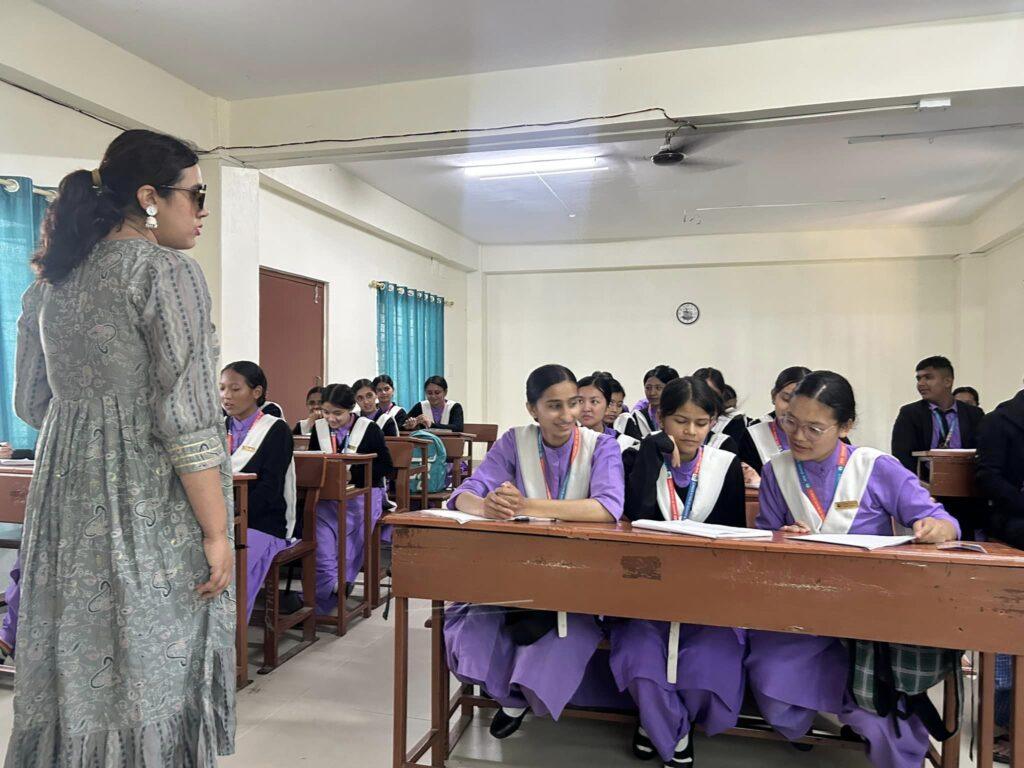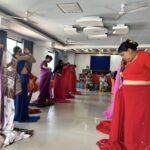
Prayatna Nepal is the self-help organization, which is working continuously to empower the living condition of women and girls with visual impairment. The organization is established by the group of both women with and without visual impairment. Among the seven board members, five (71%) are with visual impairment, including the chairperson. The idea of inclusion of women with and without disabilities in the organization is to make equal efforts from every individual with better understanding to improve the social, cultural, economic, environmental and political life of women with visual impairment.
At first, the team of Prayatna Nepal including a staff, members, and Ms. Sarita Lamichhane (chairperson of Prayatna Nepal) along with Mr. Shishir Khanal (Secretary of National Association of the Blind) went to Charak institute of health science where the program was commenced by the college head. He then handed over the floor to Mr. Shishir Khanal highlighted the objective of the training along with the introduction of Prayatna Nepal. Afterwards, initiated the session by engaging the participants in discussion, where they were asked to share their understanding of disability. He then proceeded with his session on concept of disability, where he shared international and national definitions of disability and types of disability on the basis functional limitation and severity. In this session he talked about the ten different types of disability that have been recognized/categorized in Nepal and further explained about four categories of disability based on severity (disability card/color) and its related provisions by Nepal government. He also asked the participants to share their thoughts. After this, Ms. Sarita Lamichhane took over the session by explaining about models of disability. She briefed on changes in viewing disability with time. She explained that there are basically four changes: i. First, persons with disabilities were seen with pity and they need to be helped with charity (Welfare Model), ii. Later, it was believed that disability is a deform which can be treated through medical procedures (Medical Model), iii. Then, people started looking at disabilities through social welfare lenses whereby they believed that persons with disabilities should be supported by the society (Social Model), iii. Now, people have shifted their perception into being more human rights sensitive and believing that persons with disability are humans and should be treated equally like everyone else with more meaningful participative approach (Human Rights-based Model). However, when the participants were asked to relate this modality with present situation in Nepal, most of the participants believed that Nepal is still somewhere between Medical and Social Model.
After this, she explained on understanding Barriers in Disability Inclusion in health sector. For this, she engaged the participants in group work where they were assigned 5 different case stories, in which they were asked to highlight and explain the myths, problems and solution, ultimately connecting them to health and well-being. Through this group work discussion, it was evident that most participants strongly disagreed with the stereotypical and discriminating attitude of health workers and institutions towards persons with disabilities. There was a consensus among participants that it violates the fundamental human rights of individuals with disabilities.
In the same way, the second half of the program was conducted in Gandaki Medical College, where the session was opened by the principal and then passed on to Mr. Shishir Khanal. Similar session as of at Charak institute of health science was conducted here too.
At the end of both sessions, Ms. Sarita opened the floor to the participants for questions and discussions, where participants openly expressed the benefits as well as importance of attending such workshop to reflect on their work and knowledge in relation to disability inclusion.


